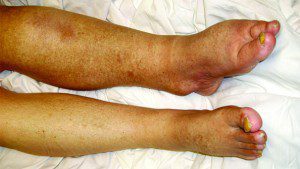By Alyssa Parker
 A compression pump is widely recognized as effective treatment option for limb swelling. Compression pumps are a safe way to assist your body’s circulatory system in moving the excess fluid which has accumulated in the limb and can cause painful swelling, non-healing wounds, heaviness, and discomfort decreasing your mobility. The compression pump is a gentle massaging technique that compresses in a rythmatic cycle, similar to that of a normally functioning lymphatic system that has not been damaged. This is a great treatment option for patients who have tried compression stocking, elevation, diuretics, or massage with little or no relief. This is a non-invasive, safe and effective way to assist your body’s circulatory system in moving the excess fluid which has accumulated in the limb and can cause painful swelling, non-healing wounds, heaviness, and discomfort decreasing your mobility.
A compression pump is widely recognized as effective treatment option for limb swelling. Compression pumps are a safe way to assist your body’s circulatory system in moving the excess fluid which has accumulated in the limb and can cause painful swelling, non-healing wounds, heaviness, and discomfort decreasing your mobility. The compression pump is a gentle massaging technique that compresses in a rythmatic cycle, similar to that of a normally functioning lymphatic system that has not been damaged. This is a great treatment option for patients who have tried compression stocking, elevation, diuretics, or massage with little or no relief. This is a non-invasive, safe and effective way to assist your body’s circulatory system in moving the excess fluid which has accumulated in the limb and can cause painful swelling, non-healing wounds, heaviness, and discomfort decreasing your mobility.
The lymphatic system serves as one of the body’s main highways through its network of vessels and ducts it works as a filtration system for body fluid entering into the blood stream. This fluid is referred to as “lymph” fluid, which is the interstitial fluid consisting of proteins, wastes, and a collection of white blood cells. The kidneys, skin, lungs, or intestines then eliminate the wastes that have been filtered out of the lymphatic vessels. If the lymphatic system is obstructed causing damage, blocked, or developed abnormally, protein-rich fluid accumulates in the tissues, the potential result may be chronic swelling known as Lymphedema.
The venous system is comprised of two parts deep circulation and superficial circulation, which are interconnected by perforating veins. The venous system is an important component to your body’s circulatory system delivering blood to the heart then passing back through the lungs to obtain oxygen to deliver back to the lower limbs of the body. Chronic venous insufficiency (CVI) involving both parts of the venous system is caused by incompetent valves and venous hypertension. Patients may experience swelling, discoloration and skin ulceration. Chronic skin ulcerations are common due to the low oxygen making it difficult to heal.
Lymphedema and CVI may cause irreversible damage to the body if not treated appropriately in an efficient manner.
Compression Pump: Preferred Treatment Option
Many individuals attempt to manage their limb swelling through various treatments such as compression stockings, exercise, diuretics, and elevation with little or no results. Pneumatic compres-
sion devices are one of the most highly recommended treatments for these conditions and are recognized by Medicare.
The compression pump is also beneficial to patients with reduced strength and dexterity who have a difficult time getting extremely tight compression stockings on each leg. The garment sleeves that attach to the pump are quick and easy to put on.
When should I see a doctor?
If you’re experiencing swelling and discomfort in a limb don’t’ let it go untreated seek help today.
Choosing a physician experienced in recognizing and treating Lymphedema or CVI is critical. Some good questions to ask your physician include:
. Does my family have a history of swelling (Hereditary Lymphedema)?
. Stemmer’s sign present?
. Pitting (push your finger into your skin and count how long it takes to return) or skin hardening?
. Hemosiderin staining (port wine skin stains or “red socks”) appear from the ankles down
. Traumatic injury or surgery potentially damaging Lymph nodes (Hip replacements, etc)?
. Radiation to Lymph areas?
Remember ANY swelling is an indication of an overloaded Lymphatic system.
The compression pump is recognized by Medicare and covered by many commercial insurers; Actual coverage varies with individual plans. Acute Wound Care, LLC is a highly focused local provider of wound products and compression pumps working with select area physicians highly versed in this condition. Our highly trained staff will assist you in finding the appropriate treatment that will offer you a better quality of life.
For more information and articles on this topic, Google “Acute Wound Care” or visit www.AcuteWoundCare.com or call
239-949-4412 and speak with a specialist.







